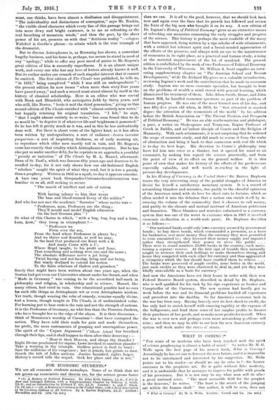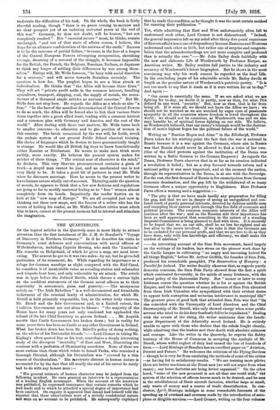WHAT IS COMING ?*
" Fon some of us modems who have been touched with the spirit of science prophesying is almost a habit of mind." So writes Mr. H. G. Wells upon the first page of his newest book, What is Coming ? Accordingly he has set out to forecast the near future, and it is impossible not to be entertained and interested by his suggestion. Mr. Wells points out to his reader—or should we say he rubs in 1—his former successes in the prophetic art. He is quite without false modesty, and it is undeniable that he manages to impress his public with proofs of his prescience. But it is not easy to say what men will do ate.? a great national crisis. " The most accessible field for the prophet is the heavens," he writes. " The least is the secret of the jumping cat within the human skull." Our author, it will be seen, does not • What is Coming By H. 0. Wells. Loaion: Cassell and Co. les-.-Titt.1 underrate the difficulties of his task. On the whole, the book is fairly cheerful reading, though " there is no peace coming to-morrow and no clear prospect yet of an enduring universal peace at the end of this war." Germany, he does not doubt, will be beaten, " but not completely crushed." Her " essential nature " must, he thinks, remain unchanged, " and out of that state of affairs comes, I believe, the hope for an ultimate confederation of the nations of the earth." Success is to be the outcome of partial failure," because, in the face of a league of the Central European Powers attempting recuperation, cherishing revenge, dreaming of a renewal of the struggle, it becomes impossible for the British, the French, the Belgians, Russians, Italians, or Japanese to think any longer of settling their differences by war among them- selves." Europe will, Mr. Wells foresees, "be busy with social disorders for a century," and will move towards Socialism certainly. The question is how far. The prophet hopes to see a blow struck at individualism. He thinks that " the Allies will become State firms." They will set " private profit aside in the common interest, handling agriculture, transport, shipping, coal, the supply of metals, the manu- facture of a thousand staple articles as national concerns." But Mr. Wells does not stop here. He regards the Allies as a whole as also "a firm." "In the face of the manifest determination of the Central Powers to do as much, the Allies will be forced also to link their various State firms together into a great allied trust, trading with a common interest and a common plan with Germany and America and the rest of the world." After dealing with these vast matters, Mr. Wells turns back to smaller concerns—to education and to 1,he position of women in this country. The break occasioned by the war will, he holds, wreck the archaic system of our present Public School classical training. His choice of languages which he desires to have grammatically taught is strange. He would like all British big boys to know foundationally either Russian or Hindustani. He wants to make men think more swiftly, more exactly. He believes the present system makes for neither of these things. " The central seat of character is the mind," he declares. This very Shavian pronouncement contains a grain of truth—a stupid man cannot be just, and an uneducated One is not very likely to be. It takes a good bit of patienoe to read Mr. Wells when he discusses marriage. Here he seems to the present writer to leave human nature wholly out of account. Thrusting aside the question of morals, he appears to think that a few new fashions and regulations are going so far to modify maternal feeling as to " free " women almost completely from its bonds. Impatiently the reader hurries on to look at his "new map of Europe." We are all occupied just now in thinking out these new maps, and the fancies of a writer who has the secret of holding his reader, as Mr. Wells's hardest critics must admit him to have, cannot at the present moment fail to interest and stimulate the imagination.































 Previous page
Previous page